 Am I a sin to God? Religious interpretation—violence in the name of God—is killing lesbian, gay, trans, bisexual and intersex persons. They might not have killed me on that bus, but have you ever seen a bus full of people, filled with the ecstasy of God? Ready to defend his words to the sinners, to stone, to judge? Those are who we live with, eat with, ride a bus with. How are we safe?
Am I a sin to God? Religious interpretation—violence in the name of God—is killing lesbian, gay, trans, bisexual and intersex persons. They might not have killed me on that bus, but have you ever seen a bus full of people, filled with the ecstasy of God? Ready to defend his words to the sinners, to stone, to judge? Those are who we live with, eat with, ride a bus with. How are we safe?
Body
16.04.2021 | by Brindley J. Fortuin
 With a work markedly attentive to the rhythms and faces, the materials and constructions, the urban surfaces and textures – in particular, of Luanda, its slums or musseques and its islands –, from an early age Ole also observed that other Angola so dissimilar from the capital, its diverse landscapes and ways of life. António Ole: Vital Matter unveils, precisely, some of these other rhythms and textures, the vital matters beyond the walls and the skin of the city.
With a work markedly attentive to the rhythms and faces, the materials and constructions, the urban surfaces and textures – in particular, of Luanda, its slums or musseques and its islands –, from an early age Ole also observed that other Angola so dissimilar from the capital, its diverse landscapes and ways of life. António Ole: Vital Matter unveils, precisely, some of these other rhythms and textures, the vital matters beyond the walls and the skin of the city.
I'll visit
14.04.2021 | by Ana Balona de Oliveira
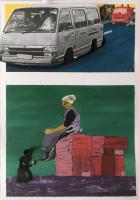 The article by Achille, I think, significantly points out the legitimacy of being limited from obtaining oxygen, by explicitly pointing out that for some parts of the world where healthcare is part of organized neglect, we are faced with more than just the need to physically breathe. There is a prohibition of breathing that is systemic in nature which is part of a larger need for the freedom to breathe (live). For example the violent killings of black civilians by the police in South Africa due to an unchecked implementation of COVID-19 laws and regulations left us questioning the relevance (need) for policing systems embedded in colonial rhetoric.
The article by Achille, I think, significantly points out the legitimacy of being limited from obtaining oxygen, by explicitly pointing out that for some parts of the world where healthcare is part of organized neglect, we are faced with more than just the need to physically breathe. There is a prohibition of breathing that is systemic in nature which is part of a larger need for the freedom to breathe (live). For example the violent killings of black civilians by the police in South Africa due to an unchecked implementation of COVID-19 laws and regulations left us questioning the relevance (need) for policing systems embedded in colonial rhetoric.
Face to face
08.04.2021 | by Marcos Jinguba
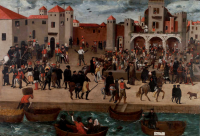 Today, we are learning that invisibility can shun and silence but cannot extinguish. And yes, colonialism can be unlearned; but to do so, it must first be confronted. Colonial amnesia is a political disease – and one for which we have yet to find a cure. Unlike the words uttered by Bruno Candé’s murderer, there are no more senzalas to return to. But, aligned with the theme of reckoning that brought us here today, to unlearn and decolonize, the past must be confronted. One way to start, would entail acknowledging the intersectionality of race-making and forge a vision of collective life not ruled by marked hierarchies.
Today, we are learning that invisibility can shun and silence but cannot extinguish. And yes, colonialism can be unlearned; but to do so, it must first be confronted. Colonial amnesia is a political disease – and one for which we have yet to find a cure. Unlike the words uttered by Bruno Candé’s murderer, there are no more senzalas to return to. But, aligned with the theme of reckoning that brought us here today, to unlearn and decolonize, the past must be confronted. One way to start, would entail acknowledging the intersectionality of race-making and forge a vision of collective life not ruled by marked hierarchies.
To read
01.04.2021 | by Patrícia Martins Marcos
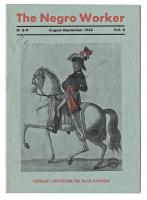 The significance of Mexico for this work is still emerging. Much more remains to be seen about just how deeply embedded the Mexican communists were in the radical networks across the Caribbean where black workers were predominant. Of what I have uncovered, the place of Mexico has two important functions in our historical understanding of the period. First, it was a place of refuge for not only radicals like the forced emigre from Republican Spain, but also for black revolutionaries like Jacques Roumain who spent some time there after being released from prison in Haiti and a short stint in Europe. Second, Mexico was the first people of color Communist nucleus in the western hemisphere, and the sense of anti-imperialism and sensitivity to chauvinism in the CPUSA was critical to strengthening the antiracist struggle across the region.
The significance of Mexico for this work is still emerging. Much more remains to be seen about just how deeply embedded the Mexican communists were in the radical networks across the Caribbean where black workers were predominant. Of what I have uncovered, the place of Mexico has two important functions in our historical understanding of the period. First, it was a place of refuge for not only radicals like the forced emigre from Republican Spain, but also for black revolutionaries like Jacques Roumain who spent some time there after being released from prison in Haiti and a short stint in Europe. Second, Mexico was the first people of color Communist nucleus in the western hemisphere, and the sense of anti-imperialism and sensitivity to chauvinism in the CPUSA was critical to strengthening the antiracist struggle across the region.
Face to face
26.03.2021 | by The Public Archive
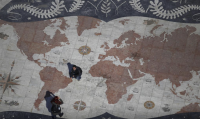 The memorial - rows of palm trees painted in black - was designed by Angolan artist Kiluanji Kia Henda and funded by Lisbon council. It will stand in the centre of the city.
From the 15th to the 19th century, Portuguese vessels carried close to 6 million enslaved Africans across the Atlantic, more than any other nation, but up to now Portugal has rarely commented on its past actions and little is taught about its role in slavery in schools.
Rather, Portugal’s colonial era, which saw countries including Angola, Mozambique, Brazil, Cape Verde, East Timor as well as parts of India subjected to Portuguese rule, is often perceived as a source of pride.
The memorial - rows of palm trees painted in black - was designed by Angolan artist Kiluanji Kia Henda and funded by Lisbon council. It will stand in the centre of the city.
From the 15th to the 19th century, Portuguese vessels carried close to 6 million enslaved Africans across the Atlantic, more than any other nation, but up to now Portugal has rarely commented on its past actions and little is taught about its role in slavery in schools.
Rather, Portugal’s colonial era, which saw countries including Angola, Mozambique, Brazil, Cape Verde, East Timor as well as parts of India subjected to Portuguese rule, is often perceived as a source of pride.
Games Without Borders
24.03.2021 | by Catarina Demony and Victoria Waldersee
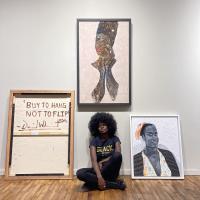 Some say the appreciation of Black art is a trend, but Black art in itself is no more a trend than “white art.” It’s part of world culture, of art history, and history is being made every day. Black art should be appreciated for its contribution to humanity and history. Black people have always collected Black art, appreciated it, and cherished it, even when it received little recognition, as acknowledged in the new HBO documentary Black Art: In the Absence of Light.
Some say the appreciation of Black art is a trend, but Black art in itself is no more a trend than “white art.” It’s part of world culture, of art history, and history is being made every day. Black art should be appreciated for its contribution to humanity and history. Black people have always collected Black art, appreciated it, and cherished it, even when it received little recognition, as acknowledged in the new HBO documentary Black Art: In the Absence of Light.
To read
19.03.2021 | by Destinee Ross-Sutton
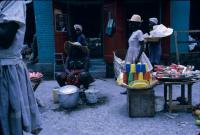 During the colonial era, the French colonists did not want to share anything with the slaves, including food. As the population grew and grew, the colonizers decided to give the slaves pieces of land called portion de vive which were to be used as a way for them to feed their own families. The producers on this land were so successful that they began to trade what they were growing.
During the colonial era, the French colonists did not want to share anything with the slaves, including food. As the population grew and grew, the colonizers decided to give the slaves pieces of land called portion de vive which were to be used as a way for them to feed their own families. The producers on this land were so successful that they began to trade what they were growing.
Face to face
18.03.2021 | by The Public Archive
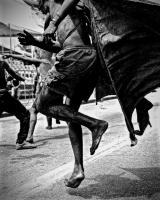 There is a present-day tendency to retreat into the realms of dystopia, of catastrophe and disaster, of failed states and fascism, of environmental collapse and economic apocalypse. This tendency is neither wrong nor mistaken. Yet it is often suffocating, only adding to the pressurized dread of the era, offering no antidote to the plague of cynicism, the chokehold of hopelessness, the drift, or, perhaps, the plunge, into a miasma of pessimism and hopelessness. Of course, there are other tendencies, other possibilities, other ways forward. Here, we briefly mention five recent books, loosely grouped under the banners of anarchism, autonomy, and utopia, that propose better worlds to come – as better must come.
There is a present-day tendency to retreat into the realms of dystopia, of catastrophe and disaster, of failed states and fascism, of environmental collapse and economic apocalypse. This tendency is neither wrong nor mistaken. Yet it is often suffocating, only adding to the pressurized dread of the era, offering no antidote to the plague of cynicism, the chokehold of hopelessness, the drift, or, perhaps, the plunge, into a miasma of pessimism and hopelessness. Of course, there are other tendencies, other possibilities, other ways forward. Here, we briefly mention five recent books, loosely grouped under the banners of anarchism, autonomy, and utopia, that propose better worlds to come – as better must come.
To read
18.03.2021 | by The Public Archive
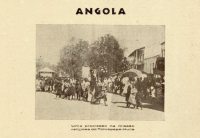 References to Portugal’s epic, seafaring past like these litter this city – there is even a Vasco da Gama shopping mall. But until now, there has never been a single explicit reference, memorial or monument in Portugal’s public space to its pioneering role in the transatlantic slave trade, nor any acknowledgement of the millions of lives that were stolen between the 15th and 19th centuries.
References to Portugal’s epic, seafaring past like these litter this city – there is even a Vasco da Gama shopping mall. But until now, there has never been a single explicit reference, memorial or monument in Portugal’s public space to its pioneering role in the transatlantic slave trade, nor any acknowledgement of the millions of lives that were stolen between the 15th and 19th centuries.
Games Without Borders
15.03.2021 | by Ana Naomi de Sousa
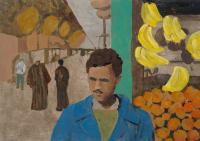 It’s a common place to say that the memory production drags with it, inevitably and concomitantly, the forgetfulness production. There are many ways of forgetfulness, the most insidious of which is, undoubtedly, the memory erasure, the past rewriting as part of a deliberated strategy of intervention in the present.
It’s a common place to say that the memory production drags with it, inevitably and concomitantly, the forgetfulness production. There are many ways of forgetfulness, the most insidious of which is, undoubtedly, the memory erasure, the past rewriting as part of a deliberated strategy of intervention in the present.
Games Without Borders
13.03.2021 | by António Sousa Ribeiro
 Certainly, the virtual dimension will take a new importance, also in light of the massive use of digital tools that this new reality brought with itself, but also in relation to the fact that artists might end up not traveling a lot like before…who knows! The art that will change is only in relation to travel and distance. What could definitely change might be the distribution channels, moving more and more into streaming and digital platforms…but I really hope that this won’t happen. The emotion that live art arouses is incomparable.
Certainly, the virtual dimension will take a new importance, also in light of the massive use of digital tools that this new reality brought with itself, but also in relation to the fact that artists might end up not traveling a lot like before…who knows! The art that will change is only in relation to travel and distance. What could definitely change might be the distribution channels, moving more and more into streaming and digital platforms…but I really hope that this won’t happen. The emotion that live art arouses is incomparable.
Face to face
12.03.2021 | by Marcos Jinguba
 Danting is clear with her intention. She was not in Italy to problematize or victimize the refugees or migrants. She was there to tell a story with her own poetics and narrative. I can not agree more with Rainer Maria Rilke that art should not be critiqued, and I do believe that I must fail in writing any critique, since I only follow my own instinctive way of following art. In this sense, and in my personal perception, I am glad to have discovered a filmic narrative from a Chinese Baip filmmaker. Her name is Danting Chen.
Danting is clear with her intention. She was not in Italy to problematize or victimize the refugees or migrants. She was there to tell a story with her own poetics and narrative. I can not agree more with Rainer Maria Rilke that art should not be critiqued, and I do believe that I must fail in writing any critique, since I only follow my own instinctive way of following art. In this sense, and in my personal perception, I am glad to have discovered a filmic narrative from a Chinese Baip filmmaker. Her name is Danting Chen.
Stages
07.03.2021 | by Cheong Kin Man
 The oppressive policies and structural inequities that underlie the conditions of poor and working class people’s lives here and abroad date from the first invasion of native territories, and the last few decades have exacerbated these conditions. What our older films reveal is the similarity of conditions now with what existed 50 years ago.
The oppressive policies and structural inequities that underlie the conditions of poor and working class people’s lives here and abroad date from the first invasion of native territories, and the last few decades have exacerbated these conditions. What our older films reveal is the similarity of conditions now with what existed 50 years ago.
Face to face
03.03.2021 | by Keelyn Bradley
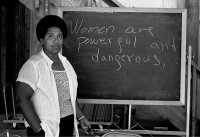 Audre Lorde asks, “What does it mean when the tools of a racist patriarchy are used to examine the fruits of that same patriarchy?” Lorde’s critique of hierarchies within what is then a predominantly white, middle-class, heteronormative, able-bodied second-wave feminism invites reevaluation of the chalk circles of individual identity that fix structural inequality and prevent viable liberation from taking shape. An existentialism disconnected from dynamic modes of praxis grounded in “the interdependence of mutual (nondominant) differences” fortifies oppression.
Audre Lorde asks, “What does it mean when the tools of a racist patriarchy are used to examine the fruits of that same patriarchy?” Lorde’s critique of hierarchies within what is then a predominantly white, middle-class, heteronormative, able-bodied second-wave feminism invites reevaluation of the chalk circles of individual identity that fix structural inequality and prevent viable liberation from taking shape. An existentialism disconnected from dynamic modes of praxis grounded in “the interdependence of mutual (nondominant) differences” fortifies oppression.
Mukanda
03.03.2021 | by Keelyn Bradley
 The events of the past six years have sharpened Gilroy's observations. At the same time, they have made it increasingly clear that, despite the real progress achieved, attempts to maintain privileges based on structural and systemic inequality, whether in terms of class, gender or race, have become even more obstinate. Attempts that go hand in hand with the futile but devastating efforts to deny history and impose the erasure of memory.
The events of the past six years have sharpened Gilroy's observations. At the same time, they have made it increasingly clear that, despite the real progress achieved, attempts to maintain privileges based on structural and systemic inequality, whether in terms of class, gender or race, have become even more obstinate. Attempts that go hand in hand with the futile but devastating efforts to deny history and impose the erasure of memory.
To read
18.02.2021 | by Paulo de Medeiros
 And so it was in these places of refuge that Black Lives Matter arose, a largely Northern- and Western-born protest movement against persistent racial discrimination in many forms. It is organic and leaderless like the Great Migration itself, bearing witness to attacks on African-Americans in the unfinished quest for equality. The natural next step in this journey has turned out to be not simply moving to another state or geographic region but moving fully into the mainstream of American life, to be seen in one’s full humanity, to be able to breathe free wherever one lives in America.
And so it was in these places of refuge that Black Lives Matter arose, a largely Northern- and Western-born protest movement against persistent racial discrimination in many forms. It is organic and leaderless like the Great Migration itself, bearing witness to attacks on African-Americans in the unfinished quest for equality. The natural next step in this journey has turned out to be not simply moving to another state or geographic region but moving fully into the mainstream of American life, to be seen in one’s full humanity, to be able to breathe free wherever one lives in America.
Games Without Borders
17.02.2021 | by Isabel Wilkerson
 “The amount we know about our African heritage varies from individual to individual,” says Johnson Artur. What they do have in common however, is a history of struggle against a commonly encountered resistance to the presence of black people in Russia. “Those who grew up and live in Russia still have to justify on a daily basis the fact that they are Russians too.” Johnson Artur hopes her project will go some to connecting and making visible the generation of black Russians that have grown up calling the country home.
“The amount we know about our African heritage varies from individual to individual,” says Johnson Artur. What they do have in common however, is a history of struggle against a commonly encountered resistance to the presence of black people in Russia. “Those who grew up and live in Russia still have to justify on a daily basis the fact that they are Russians too.” Johnson Artur hopes her project will go some to connecting and making visible the generation of black Russians that have grown up calling the country home.
Mukanda
17.02.2021 | by Red Africa
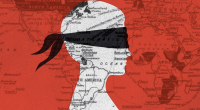 Ignoring the central role of race and colonialism in world affairs precludes an accurate understanding of the modern state system.
Worldwide protests against police racism and brutality and the toppling of statues commemorating white supremacists have led to a public reckoning in the United States and many other countries—forcing citizens and governments to confront the historical legacy of systemic racism and the enduring inequalities it has created.
Ignoring the central role of race and colonialism in world affairs precludes an accurate understanding of the modern state system.
Worldwide protests against police racism and brutality and the toppling of statues commemorating white supremacists have led to a public reckoning in the United States and many other countries—forcing citizens and governments to confront the historical legacy of systemic racism and the enduring inequalities it has created.
Games Without Borders
16.02.2021 | by Gurminder K. Bhambra, Yolande Bouka , Randolph B. Persaud, Olivia U. Rutazibwa, Vineet Thakur, Duncan Bell, Karen Smith, Toni Haastrup and Seifudein Adem
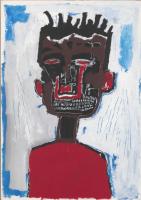 Jean-Michel Basquiat wasn’t a fan of interviews, and on the rare occasions he surrendered to them, his responses were terse—even cryptic. Despite this, the painter’s words reveal a great deal about his inspirations and his all-consuming process. They offer a window into his approach, in which he remixed references from art history, the streets of 1980s New York, and the tumult of pop culture with his Carribean heritage and his identity as a young black man.
Jean-Michel Basquiat wasn’t a fan of interviews, and on the rare occasions he surrendered to them, his responses were terse—even cryptic. Despite this, the painter’s words reveal a great deal about his inspirations and his all-consuming process. They offer a window into his approach, in which he remixed references from art history, the streets of 1980s New York, and the tumult of pop culture with his Carribean heritage and his identity as a young black man.
Stages
08.02.2021 | by Alexxa Gotthardt